8th December 1983, $1.50
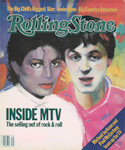
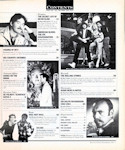
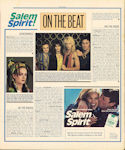
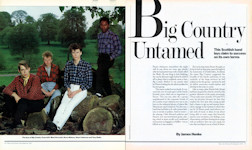
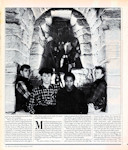
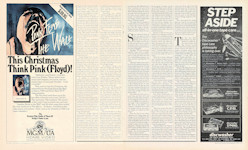
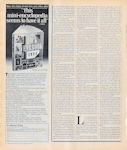
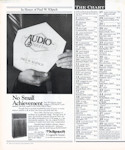
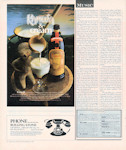
|
Rolling Stone No 410 8th December 1983, $1.50 |









|
| Page 1 · Page 5 · Page 19 · Pages 38 & 39 · Page 40 · Pages 44 & 45 · Page 50 Page 50 Page 56 |
 Back to top |
Front Cover The Big Chill's Biggest Star: Kevin Kline • Big Country Untamed ISSUE NO. 410 • DECEMBER 8TH, 1983 • $1.50 U.K. £1 Rolling Stone Inside MTV The selling out & roll Michael Jackson and Paul McCartney team up for TV Cover: Illustration of Paul McCartney and Michael Jackson by Vivienne Flesher |
|||||||||||||||||||||||||||||||||||||||||||||||||||||||||||||||||||||||||||||||||||||||||||||||||||||||||||||||||||||||||||||||||||||||||||||||||||||||||||||||||||||||||||||||||||||||||||||||||||||||||||||||||||||||||||||||||||||||||||||
 Back to top |
Page 5 CONTENTS Issue 410: "ALL THE NEWS THAT FITS" FEATURES BIG COUNTRY UNTAMED - 38 By James Henke Along with U2 and the Alarm, this Scottish quartet represents a new generation of spirited rock & rollers. Their debut album, 'The Crossing,' unleashes guitar-driven songs hope and promise. |
|||||||||||||||||||||||||||||||||||||||||||||||||||||||||||||||||||||||||||||||||||||||||||||||||||||||||||||||||||||||||||||||||||||||||||||||||||||||||||||||||||||||||||||||||||||||||||||||||||||||||||||||||||||||||||||||||||||||||||||
 Back to top |
Page 19 ON THE BEAT SCREENINGS Big Country, on tour through December 18th thanks to the success of The Crossing on Mercury, are slated to put in an appearance on the December 3rd edition of NBC's Saturday Night Live... Inset Picture of Boy George With Colour by Numbers doing brisk business and an extensive U.S. touring schedule beginning to take shape for the first half of 1984, Boy George and Culture Club will be helping Dick Clark wave adieu to the old year on ABC's Rockin' New Year's Eve this December 31st. IN THE RACKS Although romance, motherhood, and the deaths of bassist Pete Farndon and guitarist James Honeyman-Scott have more or less kept things on the back burner for awhile now, Chrissie Hynde will be back in gear again within the next few weeks. The new Pretenders album - featuring founding member Martin Chambers and newest recruits Rob MacIntosh and Malcolm Foster - is set for release on December 28th... |
|||||||||||||||||||||||||||||||||||||||||||||||||||||||||||||||||||||||||||||||||||||||||||||||||||||||||||||||||||||||||||||||||||||||||||||||||||||||||||||||||||||||||||||||||||||||||||||||||||||||||||||||||||||||||||||||||||||||||||||
 Back to top |
Pages 38 & 39 Big Country Untamed This Scottish band lays claim to success on its own terms Colour pic of Big Country - The boys of Big Country (from left): Mark Brzezicki, Bruce Watson, Stuart Adamson and Tony Butler Photo by Davies/Starr. Stuart Adamson remembers the night well. It was about two years ago, shortly after he had parted ways with a band called the Skids. He was lying in bed, thinking, the way he did every night before he drifted off to sleep, when it suddenly came to him: Big Country. Perfect! It was exactly what he'd been looking for, the ideal moniker for his new group. The name worked on two levels. It conveyed the sort of rural aspect of the band's Scottish roots, which are so important to Stuart. This was not, after all, a group anufactured in the corporate bowels of the London music industry, nor was it one born in the industrial gloom of places like Manchester and Liverpool. No, this was a band that had little to do with current fashions or trends or politics. And its music - the stirring, Celtic-flavored anthems and Stuart's own unconventional guitar playing, which at times recalls such traditional instruments as bagpipes or fiddles - was as folkish as it was modern. br> But most important, Stuart thought, as he lay in bed on that quiet, peaceful night in his hometown of Dunfermline, Scotland, the name Big Country suggested the breadth of the band's ambitions. It was symbolic of the large territory he had staked out for the group - territory he and his fellow musicians would explore and develop in the years to come. Like so many other British kids, Stuart had been inspired by what he viewed as the positive elements of the punk movement. Those early years of punk, 1976 and 1977, were his favorites because for him they marked the first time that young people had a chance to get up and express themselves onstage in the manner in which they saw fit. To Stuart, punk wasn't about a certain style of music or dress. It was about being able to write songs that honestly express your emotions, your feelings, your observations, and then sharing those songs with an audience that was your equal, not one that worshiped you as a kind of demi- By James Henke |
|||||||||||||||||||||||||||||||||||||||||||||||||||||||||||||||||||||||||||||||||||||||||||||||||||||||||||||||||||||||||||||||||||||||||||||||||||||||||||||||||||||||||||||||||||||||||||||||||||||||||||||||||||||||||||||||||||||||||||||
 Back to top |
Page 40 BIG COUNTRY CONTINUED FROM PAGE 38 B&W pic of Big Country god, the way the Rolling Stones and the Who had come to be worshiped. When the Skids started out in Dunfermline in 1977, the four original band members shared Stuart's attitudes about music. But by the time of their third album, The Absolute Game, in 1980, things had soured. Lead singer Richard Jobson become something of a preening, posing dilettante, dabbling in poetry and theater. And the audience no longer seemed to matter so much. So Stuart left the band and returned to his hometown, where he set out to form a new group, one that would not stray from that idealistic path. And lying in bed on that night in 1981, Stuart made up his mind: the band would be called Big Country. Mark Brzezicki perks up. A waiter at New York's Peking Duck House has just passed the table, his arms down with platters of the house specialty, giving Big Country's tall, stocky, twenty-six-year-old drummer cause to break the momentary silence. "This", says Brzezicki, pointing to the trayful of crispy ducks, "is the kind of place where they say, 'I'll bring you the bill later.'" The other members of Big Country - Adamson, guitarist Bruce Watson and bassist Tony Butler - groan loudly. But the bad jokes don't stop. Adamson picks up his glass of Tsingtao beer and offers a toast to New York: "I'm so happy to be here," says the twenty-five-year-old guitarist, "in the city where so many other musicians have died before me." When the four members of Big Country are together, that kind of camaraderie always emerges. "Even if we play any instruments, I think it would have been a great loss to all of us if we met one another," Brzezicki says of their friendship. But team spirit aside, there are plenty Of Other reasons to be on this night. Big Country's debut album, The Crossing, has made it all the way to Number Two on the British charts, while in America, the notoriously conservative radio programmers jumped on the record and made it one of the ten most-played LPs almost as soon as it was released. Based on initial sales figures in the US, word was that The Crossing was almost certain to sell at a half million copies. But Big Country's is no overnight-success story, not by a long shot. Chris Briggs, the A&R man who signed the band to Britain's Phonogram Records and its American sister company, PolyGram, can attest to that. "The first nine months were harrowing," says |
|||||||||||||||||||||||||||||||||||||||||||||||||||||||||||||||||||||||||||||||||||||||||||||||||||||||||||||||||||||||||||||||||||||||||||||||||||||||||||||||||||||||||||||||||||||||||||||||||||||||||||||||||||||||||||||||||||||||||||||
 Back to top |
Pages 44 & 45 BIG COUNTRY CONTINUED FROM PAGE 40 Briggs, who also works with ABC Def Leppard and Dire Straits, among others. "I definitely had some sleepless nights. There were moments of brooding into my beer, thinking, 'Maybe I'm just crazy.'" Briggs had been an admirer of Adamson's ever since hearing his soaring guitar on the Skids' punkish "Into the Valley," a British hit in 1979. So when Stuart struck out on his own, the London-based A&R man high-tailed it up to Scotland to see what he was up to. It was not an overly impressive sight, as Briggs recalls. "Big Country at that time was Stuart and four local guys. Stuart was like the master, and they were his pupils." It wasn't, Briggs remembers thinking, a lineup destined for greatness. "Stuart was already too advanced to wait for young players to pick up sufficient skill. It would have taken too long, and Stuart would have lost momentum. He needed people who could do it right there on the spot, musicians who would chase him." Despite Briggs' advice, the guitarist took that nascent version of Big Country on the road as an opening act for, of all people, Alice Cooper. It was a tour he'd just as soon forget. "We were treated very badly," he says. "We got our gear onstage as the people were conung in through the doors. And Alice Cooper, well, I couldn't believe it when I saw him. It was just completely over-the-top heavy metal." In addition to reinforcing attitudes about the despicable state of much of the old-line music business, those shows also convinced him that Briggs had been right about Big Country. "It showed how wrong we were. I think it's important that people in a group are drawn toward the same things, toward the same goal. And that just wasn't there in that lineup." Still, Adamson was impressed by the playing of Bruce Watson, the young guitarist he'd been working with. So after giving the other three musicians their pink slips, he retreated with Bruce to the basement of a local community center in Dunfermline and continued writing songs and rehearsing. Meanwhile, Briggs followed their progress and after a while was sufficiently impressed to invite them to London to cut a demo for Phonogram. Around the same time, Adamson got a call from Butler, whom he'd met on his last tour. Back then, Butler, Brzezicki and Pete Townshend's younger brother, guitarist Simon Townshend, had been playing in a trio called On the Air. That group had since broken up, but Brzezicki and Butler had established themselves as first-rate London sessionmen, playing with the elder Townshend and numerous others. Needing a rhythm section, Stuart asked them to play on Big Country's demo. "Something just clicked," Adamson recalls. It was magic right from... well, I don't know what it was. It's like when you suddenly discover that feeling you can get on a sunny Winter's morning when, even though really cold, the sun is out and you get a whole surge of energy that makes you feel great. It just felt like that." "The hair went up on the backs of my legs," says Briggs a tad more succinctly. "I was so sure that this combination of four people was going to work." So sure, in fact, that Briggs signed the group on the spot and quickly ushered them into the studio with producer Chris Thomas. Given Thomas' track record - he'd worked with everyone from Paul McCartney and Elton John to Roxy Music, the Pretenders and the Sex Pistols - and the fact that he'd already been in the studio with Butler and Brzezicki when they did Townshend's two most recent solo albums, the pairing seemed bound to result in something truly special. Or so Briggs thought. "For whatever reason, it just didn't jell," Briggs says. "Maybe we put them in the studio too early. Maybe it was because Stuart had never sung up front before." No matter what, Briggs was beginning to panic. Had he made a mistake? Had his instincts been wrong? "I was definitely having crises of confidence. I don't want to overromanticize it, but I didn't have a very happy Christmas last year." The sessions with Thomas did yield one single, "Harvest Home." But that track barely made it into the Top Hundred in Britain. It was a critical point in Big Country's career. They were a new band, and they had failed to come up with the goods after months of working with one of the world's top producers. Briggs had enough faith in the group to give them one more shot but if it didn't work this time, well, there probably wouldn't be a third chance. The band decided to try Steve Lilywhite, the young producer who had helped shape U2's similarly guitar-dominated sound. "Steve had four spare days," says Briggs, "and we went into the studio just to establish that he and the group could work together." Lillywhite one important suggestion: instead of rehashing the same material the band had plowed to death with Thomas, why didn't they try recording a new song. Big Country selected a tune called "400 Miles," an anthemic, antiwar number Adamson had written at the time of the Falklands crisis about "somebody who goes off to war and just doesn't come back." With Lillywhite behind the board, the magic that had been present at the demo sessions suddenly reappeared. "It worked the first time," says Briggs, "and it worked better than we could have hoped." The song's title was changed to "Fields of Fire," and within a matter of weeks, Big Country had their first Top Ten single in Britain. Briggs had been vindicated. "I finally came off the Valium," he says. Stuart Adamson looks up from his plate of crispy shredded beef. There's a glimmer in his narrow, a most lidless eyes. He says he has some good news to report: his father is due to return home to Scotland after having spent the past five years in Shanghai. Shanghai? "We were on the dole together," Stuart starts to explain. "I saw this advert for a job overseas, gave it to him and off he went. He was a shipbuilding engineer over there; he built something like 150 ships." Adamson's father always had a bit of the old wanderlust about him. In fact, despite his parents' Scottish background, Stuart was actually born in Manchester, where his dad was working at the time. His family moved back to Scotland when Stuart was about six months old, but thanks to a stint in the merchant marines, Stuart's father wasn't around the house too much. "I used to get up and put the fire on in the morning and get my sister ready for school, because my mom was away working at her job in an electronics factory. And when she came home at night, I'd have the dinner made." His mother also had a job in a music shop, and when she'd send Stuart out on Saturday mornings to do the shopping, she'd give him a few extra shillings so he could buy a new single. "I got everything from Billy Fury to the Kinks," says Adamson. I think the first record I ever bought with my own money was 'Death of a Clown,' by Dave Davies." From the time he was twelve, Adamson was writing songs and itching to be in a band. But he also enjoyed school, particularly geography and English, and at one point he seriously considered going to college to study to become an English teacher. liked George Orwell, D.H. Lawrence, Kafka, Chekhov. To me, reading's the same as meeting people - you can learn things from it, find out about yourself." Music, Adamson firmly believes, can serve the same purpose, which is why he's chosen it as his career. But the rigors of touring — by the end of 1983, Big Country will have played about 110 dates in Britain, Europe and America - can take their toll on family life. While on the road, Adamson phones Sandra, his wife of three years, and Callum their nearly two-year-old son, as often as possible. But no matter what the phone company says, long-distance calls aren't the same as being there, and Stuart, remembering his own fatherless childhood, frequently feels guilty about his extended absences. Because of that, he was compelled to do something he said he'd never do - buy a videotape recorder. "I didn't want one on principle. It's just far too easy to flop back in your armchair, watch your video machine and ignore the rest of the world." But he finally gave in - not so his family could watch movies while he was on tour, but for another reason: "I wanted Callum to have a record of what I was doing, so he'd know why his daddy was away so much." When he is home, Adamson tries to spend as much time as possible with his son. "It's great to watch the wee one, because kids can't hide their feelings at all. They're just so pure about everything. It's all unembarrassed. I think adults lose a lot of that. You get sort of conditioned. It'd be great if you could stay like that always — have the maturity that the years bring you and still have that great naiveté and passion for everything." Adamson draws similar strength from his wife, a former British Highland dance champion. "It's good to have a stable relationship. It's nice just to be able to go home and relax in that sort of atmosphere and think about what it is you ought to do. It's important to me." Like Stuart, Sandra grew up around Dunfermline, and in fact, it was through her brother, a musician who now plays in a band called White China, that Adamson met Big Country's spiky-haired, twenty-two-year-old guitarist, Bruce Watson. "Bruce lives on the other side of the railway tracks from us," says Stuart. "So we always joke about which one comes from the wrong side of the tracks. I think it's Bruce. Sometimes he's a real animal. He's definitely the character of the group. If anybody's feeling a bit down or anything like that, Bruce is around to get him going again." Together, Watson and Adamson have fashioned the twin-guitar attack that gives Big Country's music much of its power and appeal. "It's something I've been pushing for since the Skids," says Stuart. "Basically, I've heard enough of 'Johnny B. Goode' to last me the next twenty-five years. Bruce and I work off each other quite a lot. We do a lot of harmony work, and we each have our own effects. But what's more Important that we like to orchestrate the parts so they illustrate whatever feelings might be in the song. The conversation has clearly taken on a tone far too serious for Brzezicki, who's been busily piling down portions of the Peking duck. Pushing his plate aside, he decides its time to put in his two cents' worth. "If you want to know the real secret of our guitar sound," he says, "I'll tell you. It's in my drum kit." The last time Pete Townshend saw Tony Butler, he couldn't believe how ecstatic the Big Country bassist was. Townshend was producing his brother Simon's solo album in a London recording studio when Butler stopped by to say hello. "He couldn't speak," the guitarist remembers. "I said, 'How are things?' And he said, 'Unb... b.. unbelievable.' I said to Simon, 'You know, I'm worried about Tony. When he comes down, he's gonna come down with such a crash.' But he'll be all right." Sitting in the Peking Duck, the short, muscular twenty-six-year-old is still beaming. And not just because of Big Country. Only a week earlier, his girlfriend, Jackie Whitburn, gave birth to their first child, a seven-pound, ten-ounce boy they named Alexander. "He couldn't have called him Tony," Brzezicki cracks. "Have you ever heard of Tony the Great?" Now, after living together for eight years, Tony and Jackie are finally making plans to be married. "My life has gone through such rapid changes in the past two weeks," Butler says with a sigh. It's tempting to call Tony Butler the nicest man in rock roll. Soft-spoken and polite, he seems out of place in this world where ego and excess are the norm. But he's an undeniably solid musician, and on-stage his shyness disappears. "Tony always flies," says Townshend. "He has a side he displays onstage that doesn't appear anywhere else." Butler has known the Townshend family for years, having grown up in the same part of London, a place called Ealing. Even though his parents hail from Dominica in the West Indies, Butler, like Adamson and Watson, has a bit of Scottish blood in him. "My grandfather was born in Edinburgh," he explains. "He emigrated to the West Indies, where he started a brewery." Unfortunately, after getting married and fathering nine children, Tony's grandfather was overcome |
|||||||||||||||||||||||||||||||||||||||||||||||||||||||||||||||||||||||||||||||||||||||||||||||||||||||||||||||||||||||||||||||||||||||||||||||||||||||||||||||||||||||||||||||||||||||||||||||||||||||||||||||||||||||||||||||||||||||||||||
 Back to top |
Page 46 BIG COUNTRY CONTINUED FROM PAGE 45 by what might be called an occupational hazard. "He died of drink," says Butler. Tony's parents moved back to Britain, where they thought there would be more opportunities, but his father, a welder, passed away when Tony was six, leaving his mother to raise the family. "My mum leads a fairly simple life. She's a matron in an old people's home, and she really doesn't know much about rock & roll. So when people come up to her and say, 'I saw your son on Top of the Pops' - well, she's a little bit confused about it." Butler began playing with Simon Townshend when he was thirteen and Simon was nine. Their first band was called Clear Peace, and Pete Townshend has rather fond memories of just how awful they were, "I've got a picture of them in the back of my Mercedes 600 stretch limousine," Pete says. "They all look like they're about six years old, and they were just coming back after making some demos at a studio I had in the country. And I've never seen such a miserable-looking bunch in my life. Simon looks like he's just been hit in the face with a wet fish." Simon agrees that they were far from being a talented outfit. "That was when Tony's brother was singing. After he did the lead vocal, we all crowded around the mike and started making this horrible noise, and Pete came in and said, 'That sounds worse than the Who!'" But Tony and Simon were not to be discouraged; they placed an ad for a drummer in the back pages of Melody Maker. Mark Brzezicki, who lived in nearby Slough, auditioned and got the job. Considering his own inauspicious rock roll debut, he was the right man for Tony and Simon: didn't have enough money to buy a full drum kit," Brzezicki recalls. "I had one tom-tom and a bass drum, so I made another tom-tom out of corrugated cardboard. I used cellophane for the drum skin and coat hangers for the legs," The first time he tried to use the creation in public, disaster struck. "It was at this workingman's pub, and somebody arrived late, opened the fire-exit door, and the drum blew right off the stage!" First as the Simon Townshend Band and later as On the Air, Brzezicki, Butler and Townshend tried to establish themselves around England. But the shadow of Simon's older brother dogged them. "Simon Townshend is a young Pete Townshend," says Brzezicki. "Not because he tries to be, but he just can't help it. He sings like him. He's got the same musical mind. He plays the same." Butler and Brzezicki finally split with Simon and ensconced themselves in the London studio scene. It was a year and a half of ups and downs. There were the good sessions, like those for Pete's Empty Glass and All the Best Cowboys Have Chinese Eyes LPs. (N.B. These and many others are listed on the 'Other Work' page of my collection.) There were the silly ones, like those for TV ads and football songs. And there were the miserable ones, the ones where they were summoned to some dingy studio or the ones where some tanked-up producer would keep them hostage even though nothing was being accomplished. All the while, though, they longed to be in a band. But when Adamson finally came along, Butler found himself in the position of having to choose between Big Country and the Pretenders. "The Pretenders actually asked me to join three days before Jimmy [Honeyman-Scott] died," explains Butler. "And I sort of dithered about, wondering, 'Do I join the Pretenders and get instant fame and fortune? Or do I battle it out with a bunch of guys that I really like?'" Though he agreed to play on the Pretenders' "Back on the Chain Gang" single, he decided against joining the band. "The Pretenders had done a lot and burned themselves out in too short a time and didn't really seem to have a lot more to look forward to. But with Big Country, every day is like a different experience, a new adventure I think what struck us all was the fact that we had an unspoken common idea of life. I mean, I can't be very articulate about this, but we ve got this feeling that we just want to go out and play good music, treat people with respect and treat ourselves with respect, as well." Right now it seems as if Butler made the right choice. And Big Country's success has enabled him to fulfill a promise he made years ago, when he was getting a bank loan so he could buy one of his earliest bass guitars. "I was sitting there, trying to explain the music business to my bank manager. I was after a Rickenbacker, but then I thought I'd better settle for a copy, because it was much cheaper." The bank manager wouldn't have that, however. He gave Butler the money for the more expensive guitar. He wanted only one thing in return. "He said, 'You do me proud, boy.'" Last spring, at the end of one of the final shows on U2's British tour, Stuart Adamson found himself onstage at London's Hammersmith Palais, along with U2's lead vocalist Bono and the Alarm's Mike Peters, singing an impromptu rendition of Bob Dylan's "Knockin' on Heaven's Door." It was no coincidence that these three performers should be sharing the same stage. Big Country, the Alarm and U2 represent a new generation of rock & rollers. Given the similarities of the three bands' music - all of them write rousing, guitar-driven songs of hope and promise - it would be easy to label this as the latest trend. In fact, some have already done that: "nouveau rock" Britain's NME called it. But what really unites these groups - and there no doubt will be others joining their ranks - has more to do with their spirit and attitude than it does with their sound. And in all three cases, its a spirit that was born out of the punk movement. "Whether it was naiveté or stupidity, we all believed in the '76 explosion,' says Bono. "What we want to do is to tear down the star trips and break down the barrier between the stage and the audience." Though Adamson is wary about being lumped with other like-minded groups, he agrees with Bono. "Our definition of success is this: if you can put in your songs a feeling that can touch someone in the same way it touched vou when you wrote it, or in any other way, then you re successful. It's really important for us to be able to share what we do. For us, anyone who buys our records or comes to our shows as much a part of the group as we are." Of course, other idealists, like those original punks the Clash, have expressed similar feelings, only to abandon them at the first taste of success. But so far, Adamson has been true to his word. Like the Alarm and U2, Big Country regularly take time out after their shows to meet with their fans. "It's so important to do that," says Adamson. "If you're trying to put your feelings into your songs and kids want to come and talk to you about that and you just ignore them, well, you're just making a complete asshole out of yourself" And the band has turned down two potentially lucrative tour offers that might have significantly furthered its career. One would have involved opening the Who's 1982 stadium tour of America (an offer the Clash jumped at), while the other was for a spot on David Bowie's similarly large-scale tour of Britain this past summer. "I'm not too keen on outdoor gigs," explains Adamson. "A lot of the time, the sound is really bad, and the people in the back can't even see what's going on. I've always felt really sorry for the people way in the back." It's that concern for the audience, that feeling that the band members are really no different from the people they're playing to, that makes Big Country special. As Adamson says, "It's people that make the group, not the group that makes the people." |
|||||||||||||||||||||||||||||||||||||||||||||||||||||||||||||||||||||||||||||||||||||||||||||||||||||||||||||||||||||||||||||||||||||||||||||||||||||||||||||||||||||||||||||||||||||||||||||||||||||||||||||||||||||||||||||||||||||||||||||
 Back to top |
Page 50 THE CHART
|
|||||||||||||||||||||||||||||||||||||||||||||||||||||||||||||||||||||||||||||||||||||||||||||||||||||||||||||||||||||||||||||||||||||||||||||||||||||||||||||||||||||||||||||||||||||||||||||||||||||||||||||||||||||||||||||||||||||||||||||
 Back to top |
Page 56 CALENDAR THE ALARM: Huntington Beach, CA (11/30); Los Angeles, CA (12/1); San Francisco, CA (12.2); Niagra Falls, NY (12/4); Toronto, CAN (12/5); Detroit, MI (12/6); Cleveland, OH (12/7); Pittsburgh, PA (12/8); Buffalo, NY (12/9); Portland, ME (12/12); Boston, MA (12/13); Worcester, MA (12/14); New York City (12/5). BIG COUNTRY: Minneapolis, MN (11/23); Chicago, IL (11/25); Columbus, OH (11/26); Cincinnati, OH (11/27); Detroit. MI (11/28); Cleveland, OH (11/29). • All dates are subject to change. |
|||||||||||||||||||||||||||||||||||||||||||||||||||||||||||||||||||||||||||||||||||||||||||||||||||||||||||||||||||||||||||||||||||||||||||||||||||||||||||||||||||||||||||||||||||||||||||||||||||||||||||||||||||||||||||||||||||||||||||||